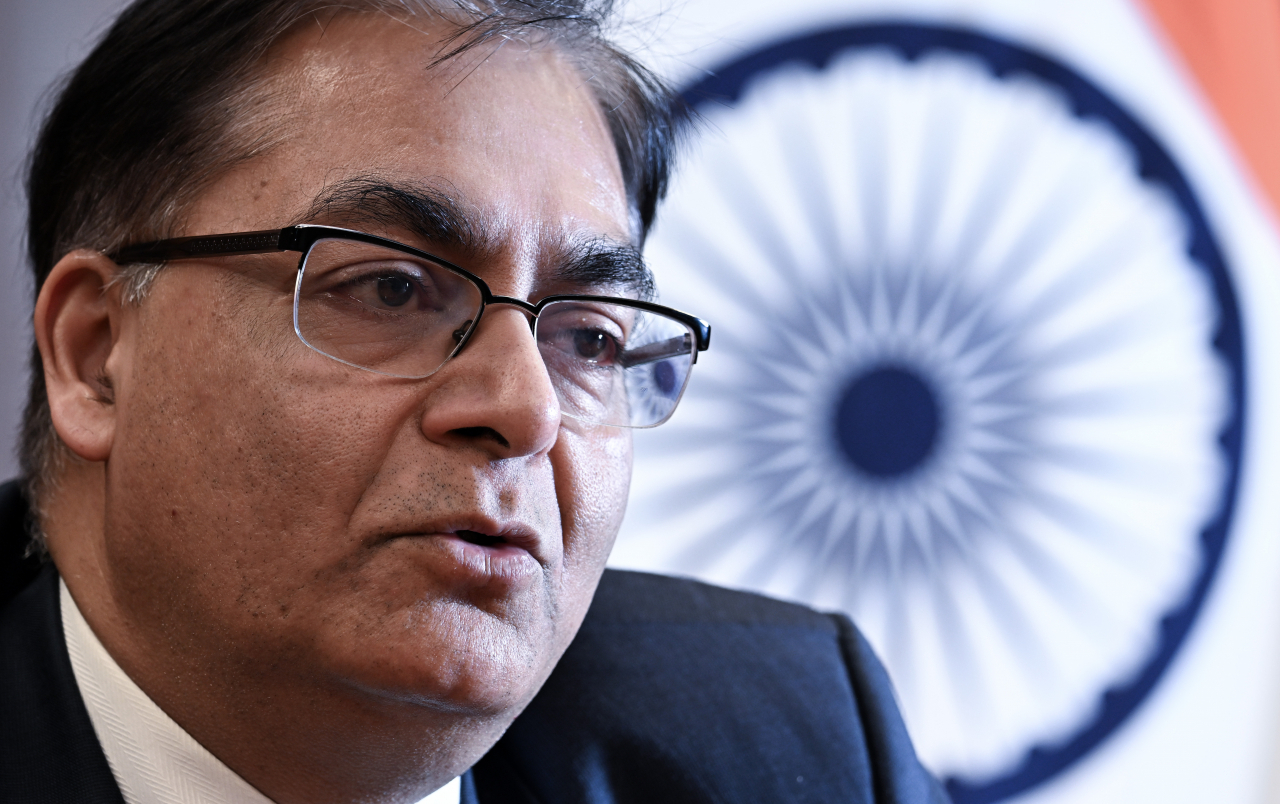 |
Indian Ambassador to South Korea Amit Kumar speaks in an interview with The Korea Herald at the Embassy of India in Yongsan-gu, Seoul. (Im Se-jun/The Korea Herald) |
Strategic technological cooperation spanning space, 5G networks and green energy holds the key to advancing the future of bilateral relations between South Korea and India, Indian Ambassador to Korea Amit Kumar said.
"I think technology will increasingly play a very important role in our partnership," Kumar told The Korea Herald on Dec. 14 at an interview held in Seoul, marking the 50th anniversary of establishing bilateral diplomatic ties. "We should explore a technology partnership from a strategic perspective for the people."
Korea and India signed a Science and Technology Agreement in 1976, marking the beginning of technological cooperation. Over time, the two countries' ties focused on economic cooperation, with investment and trade being key drivers.
Kumar expressed optimism that technology would play a central role in future India-Korea relations, however.
"There is already a very high level of technology availability in both countries," he said.
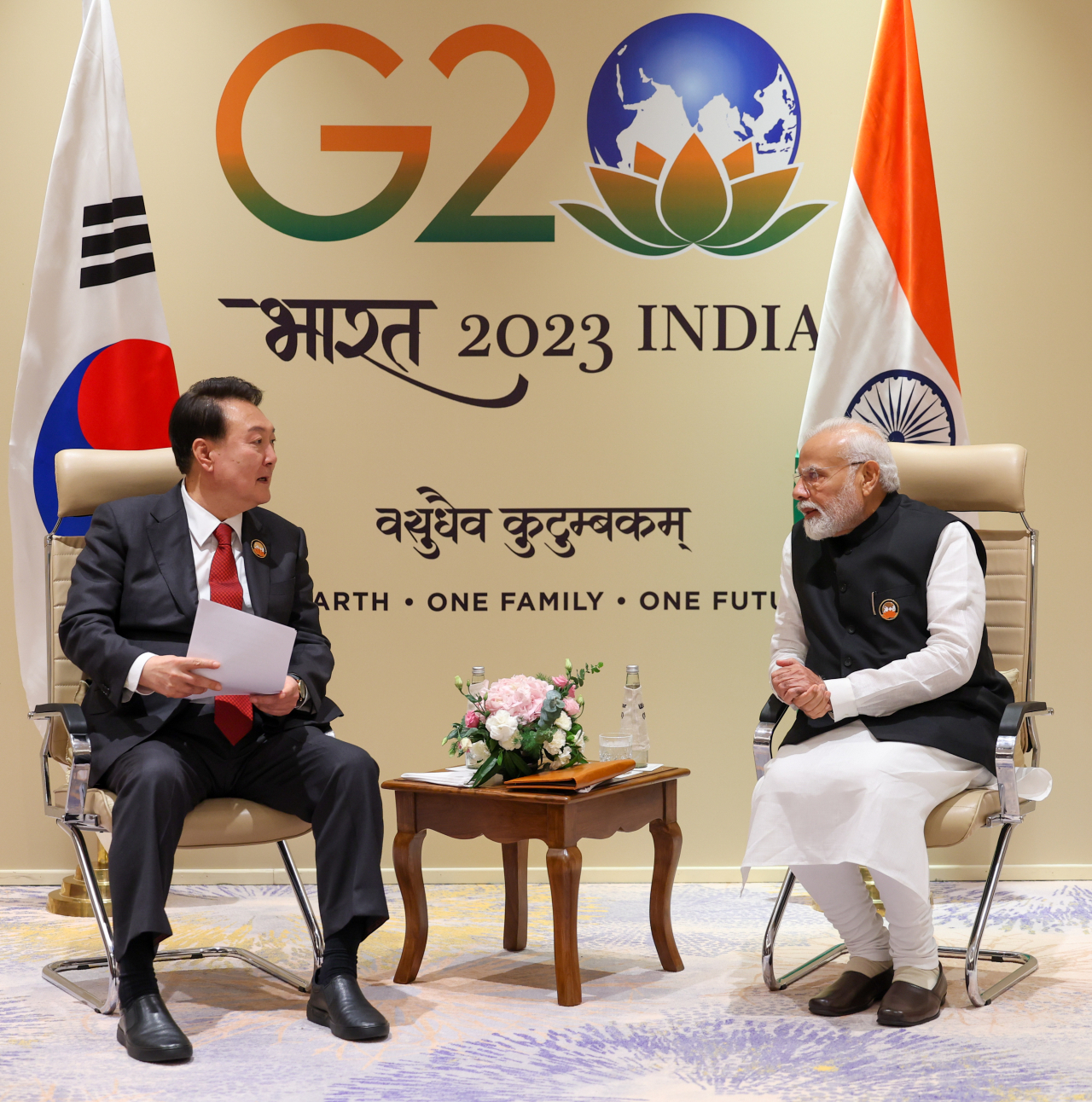 |
President Yoon Suk Yeol and Indian Prime Minister Narendra Modi discuss areas of cooperation during their bilateral meeting held on the sidelines of a Group of 20 summit in New Delhi in Sept. 2023. (Indian Embassy in Seoul) |
Upgrading space cooperation
For instance, the Korea Aerospace Research Institute and the Indian Space Research Organization have been seeking to upgrade space cooperation.
"The ISRO and KARI are in discussions on a possible framework of cooperation. I cannot commit to a timeframe here, but I think it will be sooner than later, maybe early next year," he said. "They are looking at areas like remote sensing, earth observation, lunar exploration and planetary science."
Seoul and New Delhi have a long history of space cooperation.
Korea used India's ISRO facilities to launch Kitsat-3 in 1999, and both countries are aiming to deepen cooperation in astronomy, astrophysics, planetary exploration and space science research.
Korea and India have jointly engaged in the development and launch of satellites focused on observing climate patterns, climate change and natural disasters.
 |
A snap of South Korea’s lunar orbiter Danuri of ‘Shiv Shakti point’, the landing site of Chandrayaan-3 on the South Pole of Moon’s surface. (Indian Embassy in Seoul) |
Furthermore, an implementation agreement was signed between the KARI and ISRO to promote the peaceful utilization of outer space, particularly during the state visit of former Korean President Park Geun-hye to India in 2014.
The collaboration continues through ongoing policy cooperation, including the exchange of personnel and the facilitation of joint workshops.
According to Kumar, India's liberal policies encourage fair competition and are ready to facilitate private Korean companies' manufacturing and launching of satellites, as well as knowledge sharing.
Korean President Yoon Suk Yeol and Indian Prime Minister Narendra Modi discussed enhancing space cooperation based on their countries' successful space missions -- Korea's Nuri rocket launch in May 2023, and India's Chandrayaan 3 lunar probe landing in August 2023.
Yoon and Modi agreed to strengthen collaboration in joint space missions, technology sharing and other initiatives to advance space exploration.
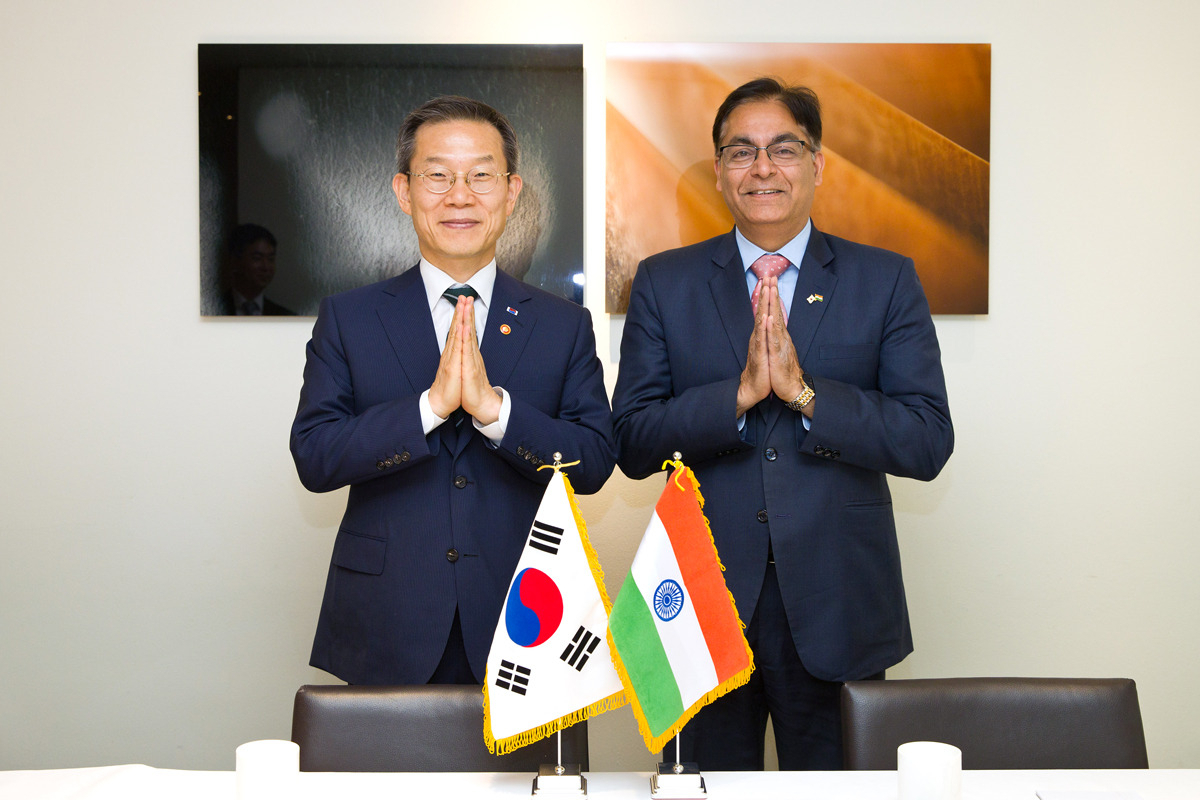 |
Indian Ambassador to Korea Amit Kumar and Minister of Science and ICT Lee Jong-Ho discuss strategies to boost science and ICT cooperation and the bilateral relationship marking the 50th anniversary of Korea-India diplomatic ties. (Ministry of Science and ICT) |
5G network exchanges
Stressing the significance of the 5G network in digital transformation, Kumar underlined the potential for India and Korea to learn from each other's experiences.
5G subscriptions in India are expected to reach 130 million by the end of 2023 and are forecast to grow to 860 million by 2029, according to the latest edition of the Ericsson Mobility report. India's 5G subscription rate in 2029 is expected to be around 68 percent.
“South Korea was one of the first countries to launch 5G services. There is scope to learn from each other's experiences,” said Kumar.
Kumar highlighted the importance of exploring uncharted territories in information technology, citing the underexplored landscape compared to the presence of Indian IT companies in Europe and North America.
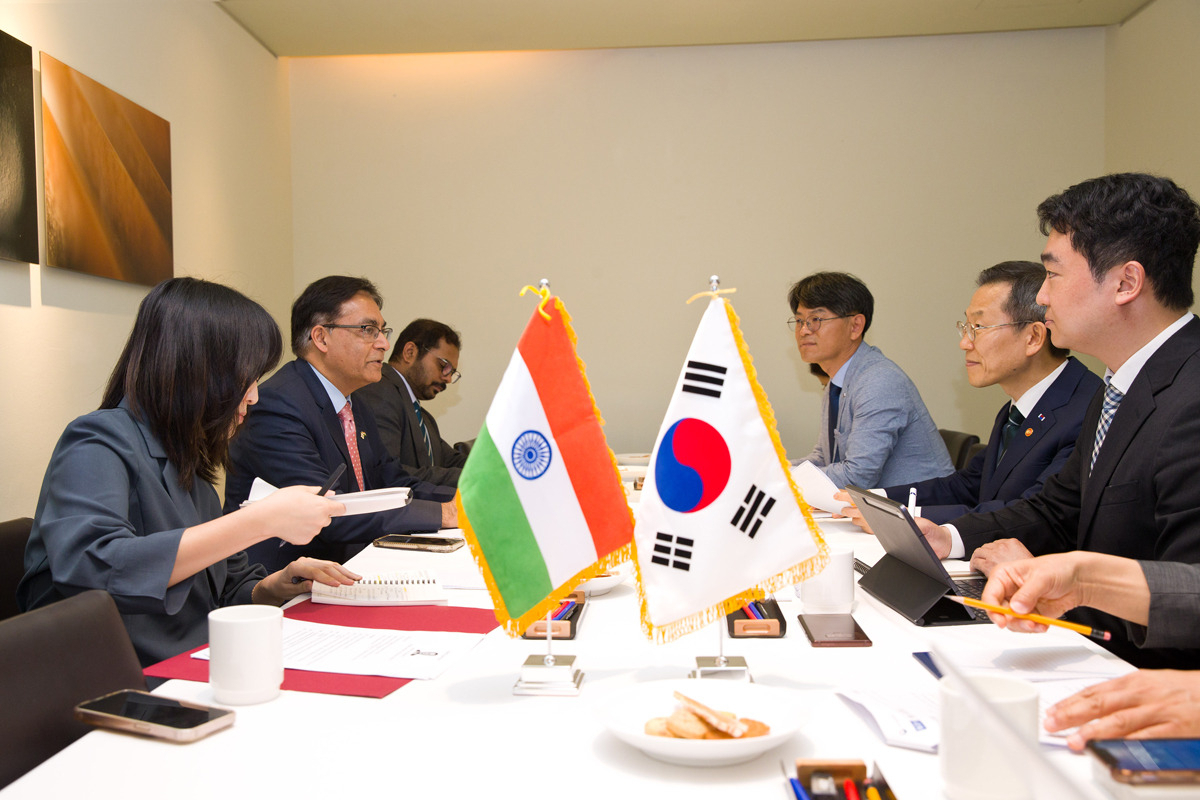 |
Indian Ambassador to Korea Amit Kumar and Minister of Science and ICT Lee Jong-Ho discuss strategies to boost science and ICT cooperation and the bilateral relationship marking the 50th anniversary of Korea-India diplomatic ties. (Ministry of Science and ICT) |
According to Kumar, cybersecurity emerged as a crucial area, with plans for a cybersecurity dialogue next year expressing optimism about Yoon's ambitious target of training 1 million Koreans in digital skills over the next five years.
“India can be a good partner,” said Kumar.
Green energy partnership
Kumar also stressed the need to create awareness about India's potential in green energy in Korea, citing Hyundai Motor Group's investment in electric vehicles in India and discussing India's ambitious plan for green hydrogen production.
Hyundai Motor Group has announced plans to invest $2.45 billion in EVs, according to the envoy.
Hyundai, the second-largest carmaker in India by market share, has revealed plans to introduce five new EV models by 2032, expanding its current lineup that includes the Kona and Ioniq 5 SUVs.
The carmaker expects to export 319,000 vehicles by 2032 and increase the number of EV charging sites to 439 by 2027.
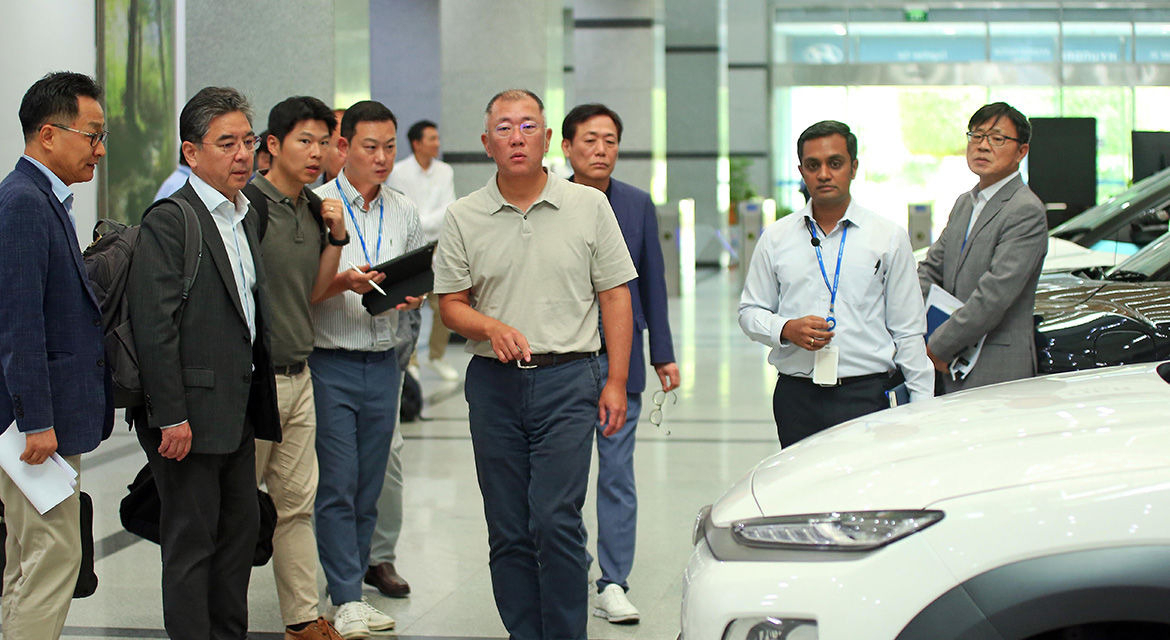 |
Hyundai Motor Group Executive Chair Chung Euisun visits Hyundai Motor Company's manufacturing site in India in Aug. 2023. (Hyundai Motor Group) |
The initiative is seen as Hyundai's commitment to advancing its presence in the Indian EV market and contributing to the growth of sustainable transportation.
India, the third-largest auto market in the world, is projected to reach 5 million unit sales by 2030, following China and the United States.
Kumar explained that some Korean companies also provide batteries for two-wheel drive EVs in particular.
Kumar also referred to the Indian government’s plan to produce hydrogen using the country’s abundance of solar energy.
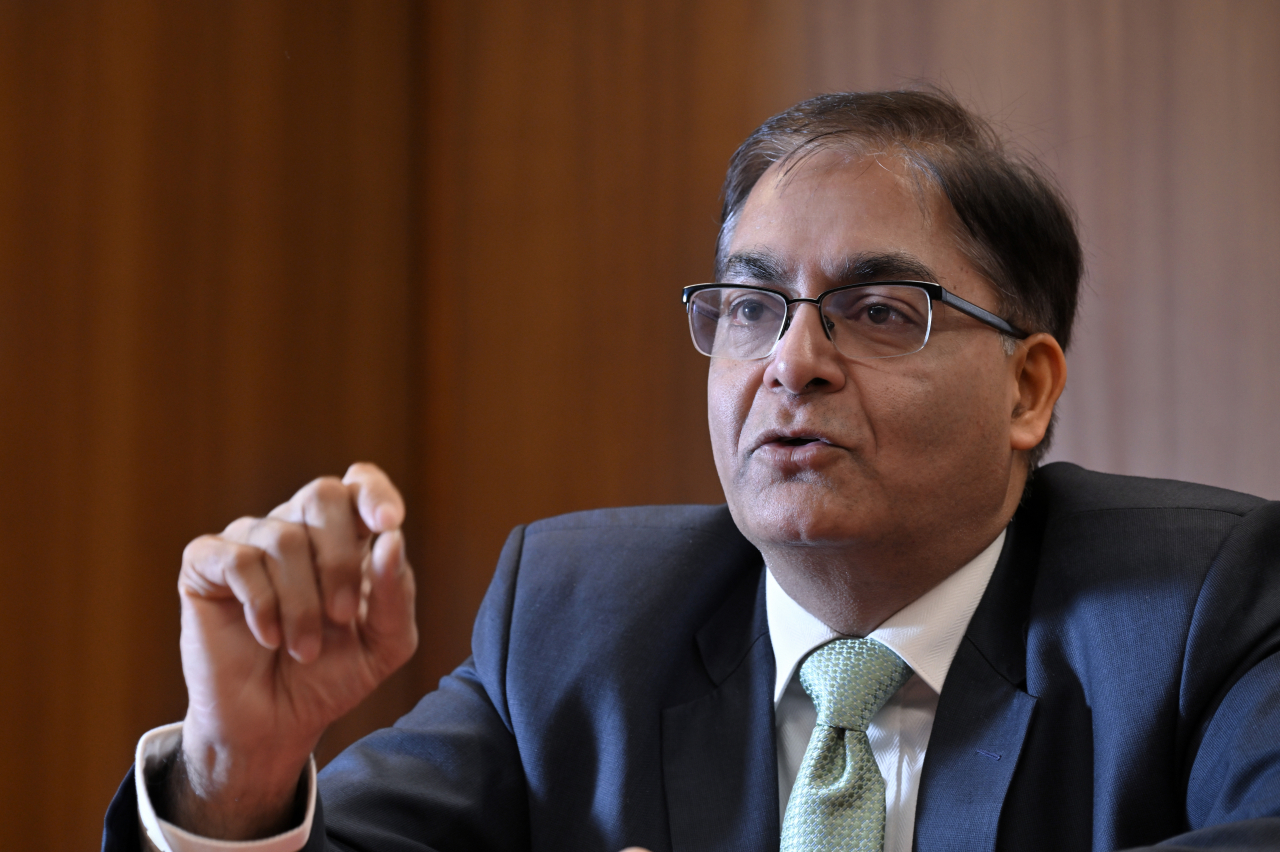 |
Indian Ambassador to South Korea Amit Kumar speaks in an interview with The Korea Herald at the Embassy of India in Yongsan-gu, Seoul. (Im Se-jun/The Korea Herald) |
“We have a production target of 5 million metric tons of green hydrogen annually by 2030,” stressed Kumar, pointing to India's National Green Hydrogen Mission, which aims to reduce the cost of green hydrogen to $1 per kilogram by 2030 in addition to the production target.
The mission aims to create export opportunities, decarbonize industrial and energy sectors, reduce dependence on imported fossil fuels, foster indigenous manufacturing capabilities, generate employment and advance cutting-edge technologies.
The associated green hydrogen energy capacity is projected to reach about 125 GW, with an anticipated reduction of nearly 50 million tons of CO2 emissions per year by 2030, according to the official website of the country's Department for Promotion of Industry and Internal Trade.
"Deployment of South Korean technologies in India, as well as imports of green hydrogen from India are both aspects India and South Korea should carefully look at," Kumar said.
“South Korea does have space constraints here in terms of producing green hydrogen,” the ambassador said, calling for Korea to partner with India to produce, deploy and import green hydrogen energy technologies.
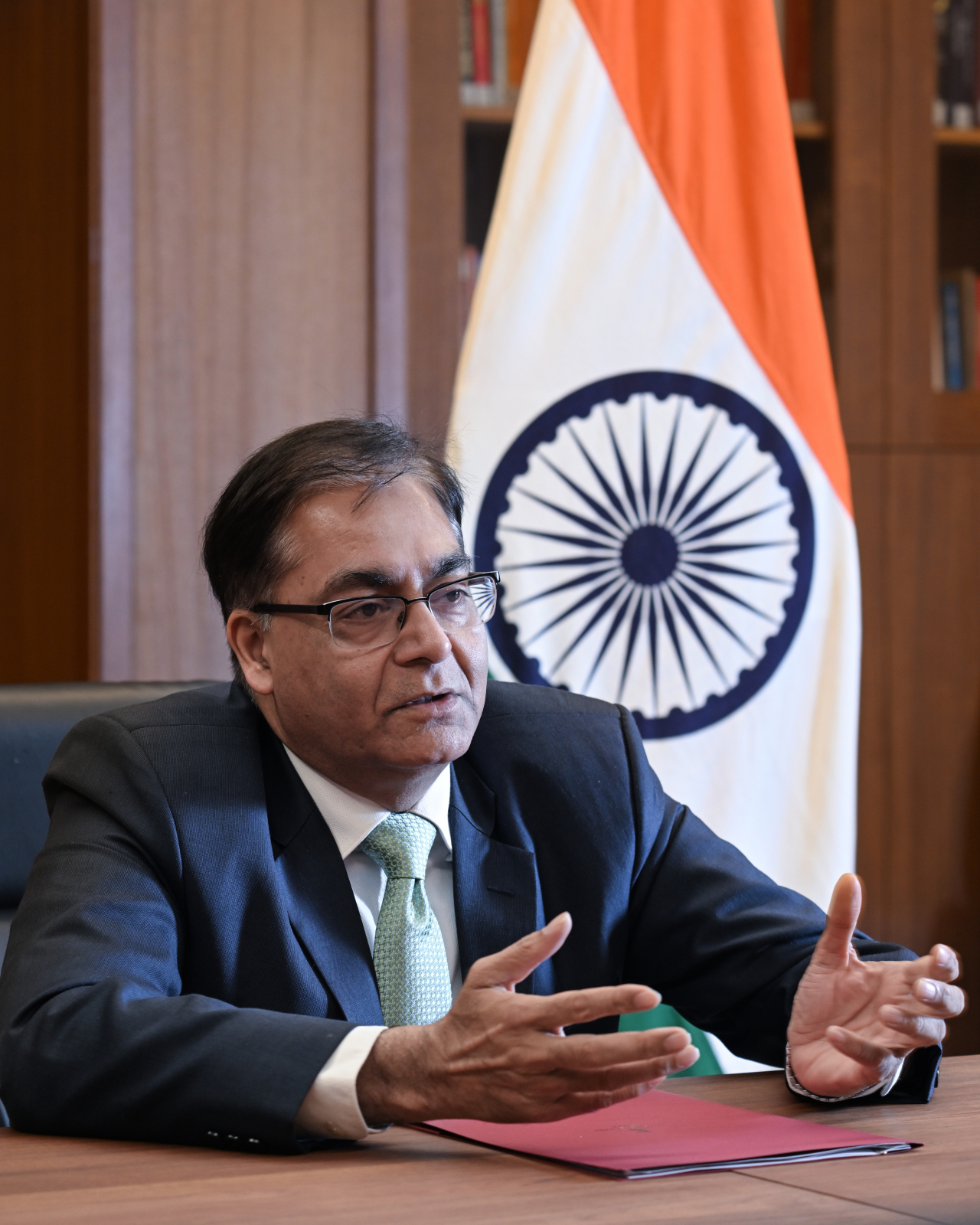 |
Indian Ambassador to South Korea Amit Kumar speaks in an interview with The Korea Herald at the Embassy of India in Yongsan-gu, Seoul. (Im Se-jun/The Korea Herald) |
Separately, when asked about Korean perceptions that India can’t be a total alternative to China for Korean companies in manufacturing, he called for companies to witness India's policy reforms, fast-growing economy, energy, dynamism and substantial improvements in the ease of doing business.
Kumar highlighted India's commitment to making supply chains more reliable and resilient seeing the country's general growth projection and its unique attributes.
"In terms of size, scale, and geographical location, these are attributes that are very difficult to replicate in any other country," Kumar said.





![[Herald Interview] How Gopizza got big in India](http://res.heraldm.com/phpwas/restmb_idxmake.php?idx=644&simg=/content/image/2024/11/20/20241120050057_0.jpg)

